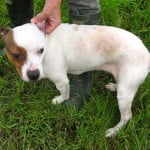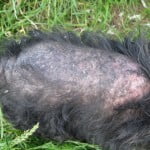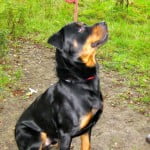Pet Advice Guides for Pet Owners
Does your dog have itchy skin?
Each month more and more dogs come in to us with skin problems. We are told that despite treatment there has been little improvement and the dogs are permanently on medication. It’s expensive – is this why they are no longer wanted? We have a good record in curing these itchy skin dogs by using natural methods. There are many different causes and identifying the problem is one of the first things to do. It’s worth considering that some dogs never get skin problems, while others only have to look at a bug and their skin becomes terribly inflamed. If a dog is in tip top condition, eating fresh and natural food and living a happy life with plenty of exercise and in a stress free environment, his immune system will be good and he will be able to shrug off ailments that will cause another dog to suffer. If your dog starts scratching it’s advisable to have a vet check and find out what’s going on. There are two main types of skin irritations in dogs – one is caused by parasites, the second is down to allergies. Parasites include fleas, ticks, lice, ear mites, mange mites, dandruff mites, harvest mites and hookworms (these are rare but can cause itchy feet especially if your dog has been in an area contaminated with faeces).
Take action quickly or that slight itch might turn into this! (a dog that was brought in and was almost bald). If you don’t know which parasite is causing your dog’s problem the vet will be able to find this out and may do a skin scraping if it’s not immediately obvious. Treatment can involve spot-on applications, sprays, shampoos or oral medication. You will also have to disinfect the dog’s environment in the home or kennel as parasites and their eggs can lurk in corners and skirting boards for a long time. Again, the vet will recommend a spray or misting application to do this. Changing the bedding frequently and hoovering every day with an attachment to get into all the crevices near where your dog sits, will go a long way to preventing re-infestation. Grooming your dog regularly and using diluted aromatic oils or crushed herbs will help also. Fleas and mites don’t like lavender or tea tree or eucalyptus! When using aromatherapy oils make sure you dilute them in a carrier, such as almond oil, before using – they are strong scents and a little goes a long way. If you have herbs in the garden you can pick them and put them in the dog’s basket. We dry lavender and mint, sage and thyme, lemon balm, etc and use them as natural air fresheners.
A cleansing diet
When a dog has a poor skin and is generally low in health we treat him holistically and give him a cleansing diet for a few days. This dog may have had factory made pet food all his life and had numerous toxic treatments – giving his digestion a rest for a while can only be of benefit. White meat or fish and boiled rice is fed intially and we supplement this with Dorwest Herbs. We’ve been using these for over 40 years – because they work! Garlic and Fenugreek tablets deal with minor infections and also a course of Mixed Vegetable tablets cool the skin down. The tablets should be given for at least one month, they can be continued long term and will do nothing but good. Evening Primrose Oil Capsules encourage coat re-growth and maintain the skin. Organic Comfrey and Calendula Balm used externally, soothes damaged skin during treatment. We often find that even in dogs with bald patches, the hair will begin to re-grow.
A fresh, natural and, if possible, organic diet should be followed as a long term preventative measure – dogs are carnivores so base it on meat or fish – lamb, chicken, rabbit, turkey with about a third of the daily food allowance being wholemeal biscuits (easy to make them yourselves) or flaked cereals. Vegetables are good but must be cooked or chopped very fine as dogs have difficulty in digesting cellulose so they need them to be broken down. We also give occasional new laid eggs – scrambled or boiled – and dogs love them. Many dogs like a drink of goats milk and this helps to give them a shiny coat – we don’t give cow’s milk as it is not so digestible.
This is a Dorwest Herb supplement that helps keep dogs in superb condition, it provides a large range of minerals and vitamins that occur naturally in eight selected herbs. We also add Cod Liver Oil to the diet, especially in winter months. Wheatgerm Oil capsules or liquid are good for skin condition and as a general anti-oxidant.
To summarize – preventing itchy skin, maintaining health and a gleaming coat doesn’t depend on any one action – an overall approach is needed. After tackling the parasites, we have to improve the dog’s general condition and provide plenty of fresh air and exercise. Good natural food and a cleansing diet are important. Keeping the dog’s environment clean and free from parasite eggs prevents secondary infection. Regular grooming with herbs for health, will keep your dog smelling good and keep parasites at bay. We put herbal flea collars on dogs that we know are prone to parasites and skin infections. We don’t use anything toxic though. Plenty of fresh water should be available at all times and a lump of sulphur in the water bowl is a good idea too. If your dog prefers to drink from puddles it’s because he doesn’t like the chlorine in tap water (nor do I!).
A holistic approach is best and don’t forget that you can buy Dorwest Herbs from us here or in our online shop. We have free Herbal Medicines Booklets in Reception and ‘In the Dog House’.
Itchy skin caused by allergies – coming next…..
Have you found this article helpful? A small donation not only helps the animals but keeps the website going [donate]



